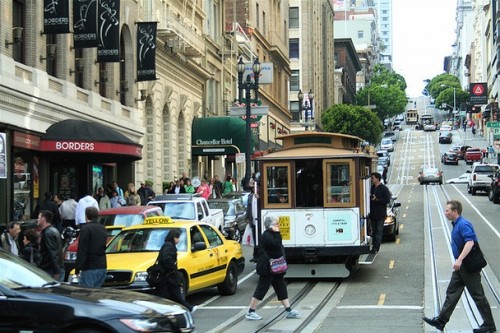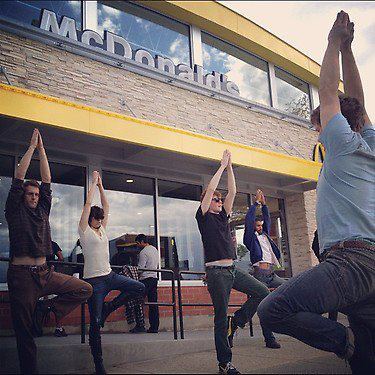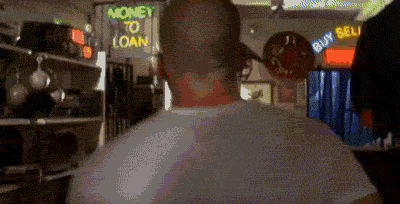
About this time last year I asked our readers, “why we don’t criticize other things like we criticize the internet?” It seemed like a fitting topic for the season; we utilize some of the most resource-intensive technologies at our disposal so that we may enjoy egg nog with old friends or taste grandma’s famous Thanksgiving day turkey. Everyone wants to be near their loved ones for the holidays, and so begins a massive effort to transport ourselves in cars, trains and planes until we arrive at our optimal holiday season arrangements. It is a wonder, then, why we spend so much of our lives outside of this optimal arrangement. What kind of relationship do we have with our immediate surroundings? Not just the people, but the technologies and the patterns. There is a lot of excellent work on carbon footprints, local food movements, and walkable communities but I hear comparatively little about who is capable of making this transition. What does opting out of the status quo truly entail? Like many problems of the modern era, we have a decent amount of data, but not a lot of actionable alternatives to remediate the situation. There is a lot of data, for example, that shows that Americans are less happy and more lonely than ever before. Robert Putnam’s Bowling Alone, the usual go-to empirical text for white people that are afraid of dying alone, has this to say on the matter:
Countless studies document the link between society and psyche: people who have close friends and confidants, friendly neighbors, and supportive co-workers are less likely to experience sadness, loneliness, low self-esteem, and problems with eating and sleeping… The single most common finding from a half century’s research on the correlates of life satisfaction, not only in the United States but around the world, is that happiness is best predicted by the breadth and depth of one’s social connections. (P. 332)
The general thesis of the book contends that the sources of social connectedness: bowling leagues, quiet hometown bars, and other kinds third places are going away as we run low on time, live further away form one-another, and consume mass media. More recent studies however, (Bowling Alone was published in 2000) have shown that the Internet will have a much more positive impact on our social lives than Putnam originally thought. According to Pew Internet: “The internet lowers traditional communications constraints of cost, geography, and time; and it supports the type of open information sharing that brings people together.” Anecdotally, I can attest to the simple pleasures of keeping in touch with friends and family across the country. If the Internet went down, or I chose to go without it, I would lose quite a bit of my social network (not to mention this sweet blogging gig). I could write letters or make phone calls, but neither can meet the efficiency and ease of checking Facebook or Twitter. I also lack sufficient information to catch up without the Internet. How many of your friends’ mailing addresses do you have? I have very few. The selection and embracing of low-tech, as PJ Rey has written, helps us feel like we are in control of technology. He concludes, “It is a fantasy of achieving the most radical expression of individual agency: the opt-out.”
Opting out in this manner requires the accumulation of enough resources and capital, that the loss of efficiency does not severely impact one’s quality of life. In fact, such opting out is supposed to enhance that life. Reestablishing the sorts of romanticized institutions that Putnam prescribes would require a lot of leisure time. Sames goes for slaughtering your own meat or biking to work. For most, the big trade-off isn’t about cost, its about time. The near-constant birage of demands for jobs and paying work makes it easy to forget that just a few decades ago Richard Nixon (yeah, Nixon) predicted most Americans would soon enjoy a four day work week. But, without the pressure of organized labor and other activist organizations to keep capitalists honest and the workplace humane, work weeks have gotten longer. After all, why pay two people to do 20 hours of work each, when you can pay one person to do 40 and save the cost of healthcare for one whole person? Why make risky investments in making labor-saving technologies when its cheaper and more predictable to just buy someone else’s labor at bargain prices? Where does “slowing it all down” fit into this? How does one start to “live locally” when jobs are a 3 hour bus ride away and the cost of housing near employment centers is too high?
Then there’s food. As Jenny Davis pointed out, the modern diet is meant to be extremely inefficient in some respects, and ruthlessly efficient in others. Food that is largely devoid of nutrition –fast food meals, pre-packaged frozen dinners– are efficient in their calories-to-dollars ratio. Pound for cash, the frozen food section will feed a family quicker and cheaper than the produce section. Factory farming is environmentally disastrous, but it does produce a lot of very cheap calories. Sometimes, this argument is taken to odd extremes. For example, Pierre Desrochers, a libertarian technological determinist that hates Michael Pollan, says to his CATO institute audiences that the only role for local farming is niche markets for rich people. He is right in one respect: under capitalism (and the underlying engines of technique) the rich will be the only ones to exclude themselves from poisoned food, air, and water.

Movements that ask individuals to “slow down” without proffering a critique of capitalism are, by their nature, elitist. Plenty of good intentions (not to mention labor and capital) have gone into movements that claim to provide a means for opting out. Some work, many of them do not. Urban gardening can bring healthy food to the tables of poor people, only if the food comes with the knowledge, space, and time to cook it. Protest that focuses on the deleterious health and environmental effects of fast food (as seen in Fast Food Yoga above), without an equally explicit critique of the structural inequalities that make fast food such an appealing option to the working poor only serve to alienate them from the movement.
Indeed, urban gardening can serve a myriad of purposes outside of providing food (for example, it can remediate some of the social cohesion problems described by Putnam) but this means we must be careful to temper our mission statements and personal claims about what we are capable of achieving. Let’s continue to build gardens and live in walkable neighborhoods, but we should also recognize the sociotechnical structures that prevent fundamental change. Opting out of fast food and cars would undeniably help the environment and society, but to ask any one individual to forego the efficiencies of modern life is a demand on their own personal resources. Instead of asking individuals to give up their Facebook accounts and their cars, academics and activists need to find new ways of providing the same or comparable services that embody a different sort of politics. Build a world where Facebook is obviously the inferior mode of communication and fast food just seems gross. It means building the capacity for critical human engagement outside of the confines of capitalist notions of efficiency.
I live a fast-paced hedonistic lifestyle on twitter: @da_banks
Also, its my birthday so I’m allowed to do whatever I want. Here’s a gif of truckosaurus that was GIFted to me by @nathanjurgenson: 
Also, here’s one I got from @disco_stu
From @nick_lalone

From @ferocissima






Comments 20
A hypocrite — November 21, 2012
I agree that the main point of nostalgic embrace of earlier forms of technology is their inefficiency. It's in this sense that these movements have their moment of truth, that they draw attention to very real problems caused by submitting every aspect of society to the logic of capitalist efficiency.
But they have a limit: their solutions often implicitly rely on that same efficient logic of the market. They market themselves as new lifestyles, hoping to provoke enough demand that new niche businesses will be created to meet it. But these businesses are inevitably supported by the most advanced aspects of global capitalism: financial speculation, transportation networks, global IT infrastructure, multinational corporations, global labor markets and so on.
The upper-middle class white collar workers who are able to afford organic food are usually the ones who are directly involved in managing this. They are able to afford a relatively inefficient lifestyle because, as a class, they drive efficiency elsewhere in the economy.
However, accusing the upper middle class of hypocrisy and elitism provides ideological support to the Right. The contradictions in these movements are used to silence them, typically by claiming that since their actions do not follow from their rhetoric, it's all just a status game and they don't really believe in anything. This is taking a structural contradiction and falsely personalizing it. For example, Occupy Wall Street was denounced as a bunch of pretentious hipsters by many right wing commentators, to the effect that they're just against capitalism because its too mainstream. Or this image which was widely circulated at the height of the protests.
This is the end result of the post-modern left's nihilistic embrace of radical value neutrality, which undermines its own causes.
Connie momo Kerr — November 22, 2012
I can't not believe I missed the op to send a gif for your birthday. But! there are 2 here from two of my favorite people I wanted to send. so essentially i did send them through the internet with my mind powers. AND on a side note. Don't eat the turkey until it's fully cooked or "YOU'LL GET WORMS" Buttafingah! bumpisass! I love traditional holiday shit. Happy Birthday Geek!
Friday Roundup: November 23, 2012 (A Day Late) » The Editors' Desk — November 24, 2012
[...] The Cost of Opting Out on Cyborgology [...]
In Their Words » Cyborgology — November 25, 2012
[...] “Build a world where Facebook is obviously the inferior mode of communication and fast food just seem...” [...]
TeachThoughtThe Impact Of Technology Reading List: Why We Buy iPads — November 29, 2012
[...] “Build a world where Facebook is obviously the inferior mode of communication and fast food just seem...” [...]
Linkspam, 11/30/12 Edition — Radish Reviews — November 30, 2012
[...] The Cost of Opting Out Thought-provoking piece on how movements that ask people to opt out or slow down without criticizing the capitalistic system as well are by nature elitist. I had a recent argument on Twitter with someone who didn’t quite understand this. [...]
52. READ. LOOK. THINK. | JESSICA STANLEY. — December 6, 2012
[...] Scientists discover children’s cells living in mothers’ brains. | The privilege of opting-out. | Aesthetic categories. |The sexless aspirational world of lifestyle blogging. (Magic Surrounds [...]
IS THE INTERNET MAKING OP-ED WRITERS LAZY? » Cyborgology — December 7, 2012
[...] Oh, and make sure your readers know you are wealthy by mentioning your Cape Cod or European vacations, but don’t bother questioning how being able to opt out of certain technologies is, in part, a byproduct of your privilege. [...]
Weekend Reading « Backslash Scott Thoughts — December 9, 2012
[...] The Cost of Opting Out. [...]
The Cost of Opting Out » Cyborgology | fu... — April 21, 2013
[...] [...]
The Mendeley Dilemma » Cyborgology — July 27, 2013
[...] to have several peer-reviewed publications under their belt before they get their Ph.D. The cost of opting out, in my opinion, is too much to ask. I know some grad students that happily do their bibliographies [...]
“There are enough Instagram photos of the beach” | DisCoverage — July 28, 2013
[...] Or, in Nathan Jurgenson’s words, to make the case for “pass[ing] off an irrational and unsubstantiated fetishization of what you deem ‘real’ as instead a simple, nostalgic appreciation for retro, vintage, slow, and disconnected”. (Being able to opt out of certain technologies is also a by-product of the privilege of wealth). [...]
“There Are Enough Instagram Photos of the Beach”: True or False? | How Can I Find Someone — July 29, 2013
[...] Or, in Nathan Jurgenson’s words, to make the case for “pass[ing] off an irrational and unsubstantiated fetishization of what you deem ‘real’ as instead a simple, nostalgic appreciation for retro, vintage, slow, and disconnected”. (Being able to opt out of certain technologies is also a by-product of the privilege of wealth). [...]
Banking in the Shell of the Old Society – @OccupyMoneyCoop » Cyborgology — July 30, 2013
[...] alternative to traditional banking, Occupy makes it possible –maybe even desirable– to opt out of corporate banking while suffering minimal damage to one’s own ability to survive. It isn’t a [...]
#TwitterAlerts is Bad for Twitter » Cyborgology — October 2, 2013
[...] the status quo. Compromise too much and you end up reinforcing the systems you want to dismantle. Opt out of too many systems and you risk ineffectiveness. Twitter Alerts just adds another consequence to [...]
The Rise of Friendsgiving » Cyborgology — November 28, 2013
[…] to those that can afford to visit family on Thanksgiving or are too precariously positioned to opt out of the retail holiday. Thanksgiving, Friendsgiving, and Black Friday are interconnected by the […]
The Cost of Opting Out | David A Banks — March 6, 2014
[…] Read more on Cyborgology […]
Don’t Opt Out, Take Back » Cyborgology — August 4, 2014
[…] or become more brazen and aggressive in their advertising research. As I’ve written before, Opting out becomes more difficult as you go down the socioeconomic ladder. If you really didn’t like the […]
The Privilege of Disconnection » Cyborgology — August 21, 2014
[…] everyday connections with friends and family, to simply entertain themselves. And we do write about the cost of opting out, and we also write about how “opting out” isn’t actually possible. But we […]